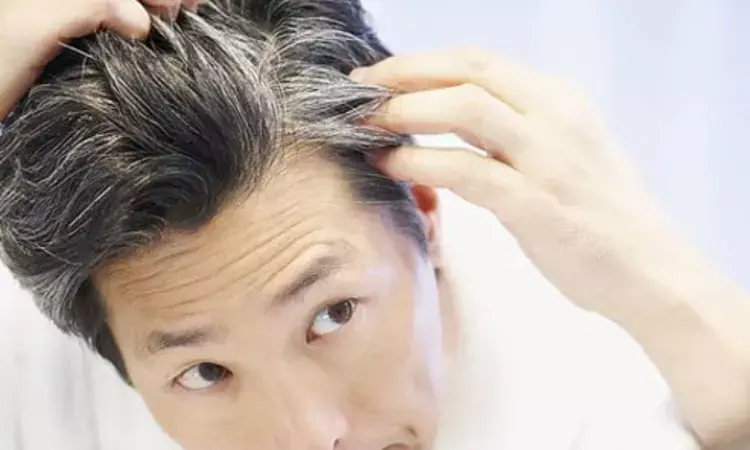- Home
- Medical news & Guidelines
- Anesthesiology
- Cardiology and CTVS
- Critical Care
- Dentistry
- Dermatology
- Diabetes and Endocrinology
- ENT
- Gastroenterology
- Medicine
- Nephrology
- Neurology
- Obstretics-Gynaecology
- Oncology
- Ophthalmology
- Orthopaedics
- Pediatrics-Neonatology
- Psychiatry
- Pulmonology
- Radiology
- Surgery
- Urology
- Laboratory Medicine
- Diet
- Nursing
- Paramedical
- Physiotherapy
- Health news
- Fact Check
- Bone Health Fact Check
- Brain Health Fact Check
- Cancer Related Fact Check
- Child Care Fact Check
- Dental and oral health fact check
- Diabetes and metabolic health fact check
- Diet and Nutrition Fact Check
- Eye and ENT Care Fact Check
- Fitness fact check
- Gut health fact check
- Heart health fact check
- Kidney health fact check
- Medical education fact check
- Men's health fact check
- Respiratory fact check
- Skin and hair care fact check
- Vaccine and Immunization fact check
- Women's health fact check
- AYUSH
- State News
- Andaman and Nicobar Islands
- Andhra Pradesh
- Arunachal Pradesh
- Assam
- Bihar
- Chandigarh
- Chattisgarh
- Dadra and Nagar Haveli
- Daman and Diu
- Delhi
- Goa
- Gujarat
- Haryana
- Himachal Pradesh
- Jammu & Kashmir
- Jharkhand
- Karnataka
- Kerala
- Ladakh
- Lakshadweep
- Madhya Pradesh
- Maharashtra
- Manipur
- Meghalaya
- Mizoram
- Nagaland
- Odisha
- Puducherry
- Punjab
- Rajasthan
- Sikkim
- Tamil Nadu
- Telangana
- Tripura
- Uttar Pradesh
- Uttrakhand
- West Bengal
- Medical Education
- Industry
Low dose minoxidil improved trichometric density regardless of antagonistic medications, finds study

A new study by the team of Deesha Desai unveiled that the concurrent use of drugs that are mechanistically antagonistic may not have an impact on the effectiveness of low-dose oral minoxidil for the management of alopecia. The findings of this study were published in the Journal of American Academy of Dermatology.
Low-dose oral minoxidil (LDOM) has been used off-label to treat alopecia for which there were previously few effective treatments. When used in greater dosages, minoxidil acts as an antihypertensive drug by affecting potassium channels and causing smooth muscle vasculature to relax and vasodilate. It is presently believed that when used in small doses to treat alopecia, it will increase the blood flow around the hair follicle and promote hair growth while having no effect on blood pressure (BP). Numerous OTC and prescription drugs have the potential to interfere with vasodilation and reduce blood pressure decreases. These drugs may lessen the effectiveness of LDOM as they have an "antagonistic" effect on the antihypertensive qualities of the mechanism of action.
Through the use of HairMatrix trichometric hair measures, this study sought to objectively evaluate the impact of the drugs on LDOM treatment results. This retrospective study had individuals examined by NYU Dermatology between January 1, 2009 and August 28, 2023 who were administered LDOM as authorized by the NYU Institutional Review Board.
A total of 71 patients in the patient cohort were diagnosed with non-scarring alopecia (91.5%). NSAIDs and stimulants were the two most commonly prescribed antagonistic drugs. For the entire cohort, there was a change in median trichometric density and width of 21.06 hairs/cm2 and 2.94µm, respectively. The decrease in median trichometric breadth and density for individuals taking antagonistic medicines simultaneously was 5.5µm and 18.5 hairs/cm2, respectively. The change in median trichometric breadth and density for individuals who were not taking antagonistic drugs simultaneously was 2.0µm and 22.0 hairs/cm2, respectively. Also, the trichometric breadth and density changed similarly across cohorts, with no discernible differences. Close to 23 individuals reported adverse events related to tolerability and there was no discernible variation in the occurrence of side effects between groups.
This study supports the effectiveness and tolerability of LDOM by showing that mechanistically opposing drugs may not have an impact on the therapy response for alopecia. Clinicians should urge patients to take their prescribed drugs on time without worrying that it would impede their progress towards hair growth.
Source:
Desai, D., Nohria, A., Sikora, M., Buontempo, M., Shapiro, J., Caplan, A. S., Garshick, M., & Lo Sicco, K. I. (2024). Navigating Treatment Challenges: Assessing the Influence of Medications with Antagonistic Effects on Low-Dose Oral Minoxidil in Patients with Alopecia: A Retrospective Study. In JAAD International. Elsevier BV. https://doi.org/10.1016/j.jdin.2024.05.010
Neuroscience Masters graduate
Jacinthlyn Sylvia, a Neuroscience Master's graduate from Chennai has worked extensively in deciphering the neurobiology of cognition and motor control in aging. She also has spread-out exposure to Neurosurgery from her Bachelor’s. She is currently involved in active Neuro-Oncology research. She is an upcoming neuroscientist with a fiery passion for writing. Her news cover at Medical Dialogues feature recent discoveries and updates from the healthcare and biomedical research fields. She can be reached at editorial@medicaldialogues.in
Dr Kamal Kant Kohli-MBBS, DTCD- a chest specialist with more than 30 years of practice and a flair for writing clinical articles, Dr Kamal Kant Kohli joined Medical Dialogues as a Chief Editor of Medical News. Besides writing articles, as an editor, he proofreads and verifies all the medical content published on Medical Dialogues including those coming from journals, studies,medical conferences,guidelines etc. Email: drkohli@medicaldialogues.in. Contact no. 011-43720751


